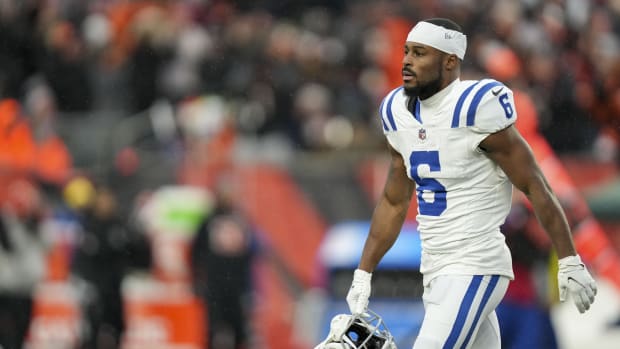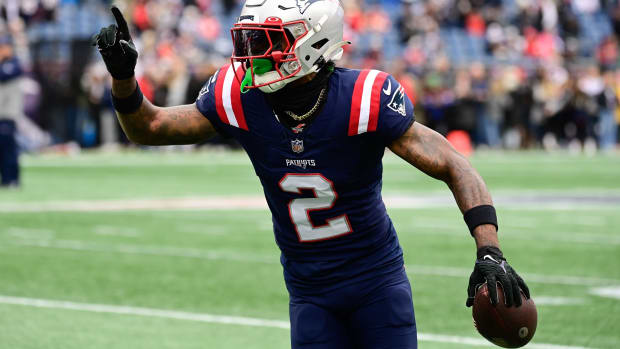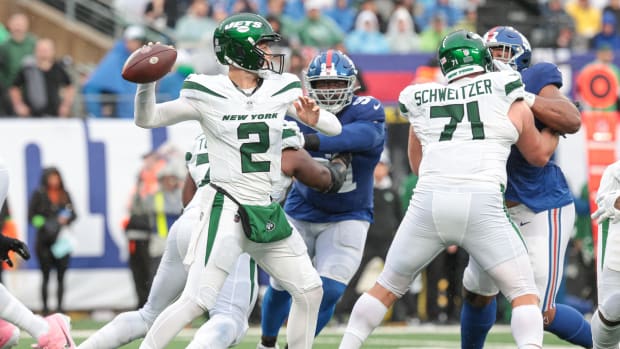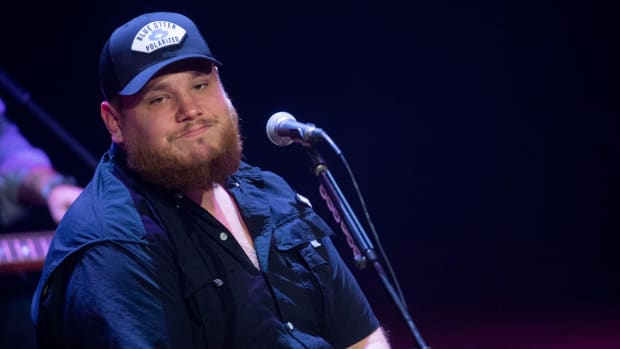Perspectives on the Giants' passing of the quarterback baton
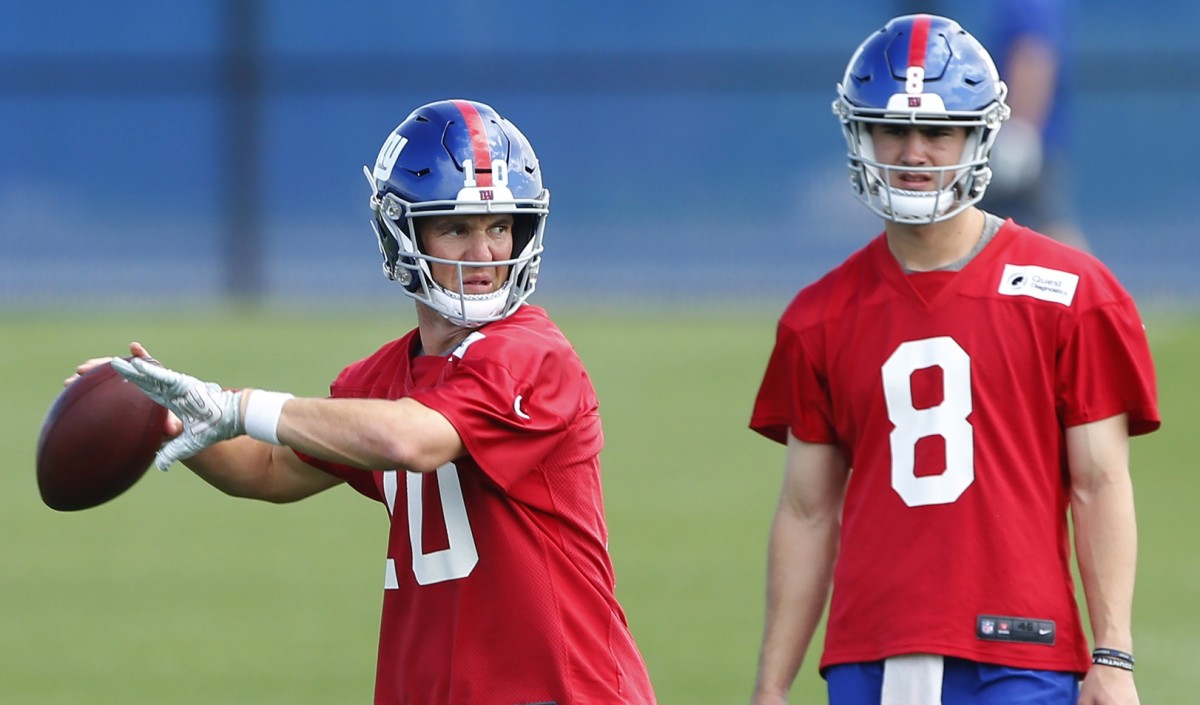
Every year, there are changes made to the personnel of a pro football team, changes that often don’t get more than a second glance or mention from the media.
But the New York Giants decision to officially pass the quarterback torch from long-time veteran Eli Manning to rookie Daniel Jones after the team’s third straight 0-2 start is the exception.
Although this move was inevitable, it was not at all what anyone in the Giants organization was hoping for their two-time Super Bowl hero and holder of most of the franchise’s passing records.
The hope was that Manning, playing behind a vastly improved offensive line and with a stud running back, would make the Giants competitive again, maybe even turn them into a playoff contender.
That didn’t happen, and while it’s not Manning’s fault—he has nothing to do with the rebuilt defense that through two regular-season games as struggled worse than anyone imagined—the decision was made by head coach Pat Shurmur (and no doubt signed off on by general manager Dave Gettleman and the team ownership duo of John Mara and Steve Tisch) to end Manning’s tenure as the team’s starter and turn the reins over to Jones, the sixth overall pick in this year’s draft.
I’ve had the pleasure of covering Manning since his rookie season. I was there for the blockbuster trade, and I was there for his struggles as a rookie as well as his triumphs in Super Bowls XLII and XLVI.
In the past several years, I’ve firmly been a Manning supporter, believing that the front office did him wrong by not putting competent offensive lines in front of him and not surrounding him with the talent to succeed.
I've also been extremely appreciative to Manning for all the times he took a few minutes out of his schedule to help me with special requests and to share a joke or two from the Seinfeld television series, a forvite of his growing up and one that I discovered a few years ago after an off-season of binge-watching.
But I’m also a realist. I saw the decline, and even before the team drafted Jones sixth overall, I had a feeling that this year they might look to add their franchise quarterback--at one point very early on in the off-season, I even suggested their trading back into the bottom of the first round to acquire a quarterback.
This is a bittersweet day for the Giants franchise and its fanbase because while it is not the ending anyone wanted to see for Manning, it also marks the beginning of a new era that’s filled with something that the Giants media and fan base hasn’t had for a while: hope for the future.
Here are a few other thoughts about this historic changing of the guard, er, quarterback…
1. While people knew the change was coming, the timing of the change was a surprise.
The original plan, from what I could gather, was that as long as the Giant were competitive and were in the playoff hunt, which regardless of the product they’ve put out there on the field, they still are in the hunt, Manning would remain under center.
The problem is the Giants haven’t been competitive, which is the first step toward having a chance at the playoffs.
They’ve lost each of their first two games by two or more touchdowns. That’s not being competitive; that’s being a mess.
While that’s not all Manning’s fault, the sad reality is that despite generating over 400 yards of total offense in both games, they struggled to score points, struggled to sustain drives and Manning, try as he might, couldn’t elevate the team around him to deliver when the chips were down.
When that happens, well sometimes you need to make a change. Over the years, the Giants changed offensive coordinators, head coaches, and personnel at every position except quarterback.
It was time to address the quarterback.
2. Some will argue that the Giants might have waited for a soft spot in their schedule to put Jones in there full time. Well given the “any given Sunday” mentality of the NFL, there probably was no “right time” or “soft spot” in the schedule to plan around.
The truth is that Jones is going to face struggling teams and teams who are powerhouses. And he’s going to have to learn how to stand up to both and every team in between.
This notion of coddling him to protect him from the Patriots of the world was silly, and I’m glad that head coach Pat Shurmur in reaching the decision he did, didn’t get hung up on that.
3. There is still a bit of question regarding the financial aspect behind the decision, namely why the Giants held on to Manning and paid out the $5 million roster bonus that he received shortly after the start of the new league year in March and why they didn’t attempt to negotiate a pay cut on his $11.5 million base salary.
According to Over the Cap, Manning was due the roster bonus on March 17. Meanwhile, the Giants picked up an extra first-round pick in the Odell Beckham trade on October 13.
Even with the extra first-round pick, the Giants had no guarantees they’d get the quarterback (Jones) they were eyeballing, so they had to keep Manning on the roster.
They also had to protect themselves in the event the quarterback they drafted didn’t progress as rapidly as he ended up doing.
As for why the Giants didn’t lower his cap hit even if they knew they had a chance at a quarterback, they would have had to add on a “dummy year” to absorb the prorated signing bonus that likely would have resulted by converting part of his base salary to an up-front bonus.
That wasn’t going to happen, not when the Giants figured they had a chance at getting a franchise quarterback and with the Giants also looking to clear out cap space for the 2020 season.
Had Jones not developed as quickly as he had, then perhaps Manning would have received a contract extension. But that was probably the last resort.
That Manning never received that extension, which some believed might be coming regardless, was a big indicator that the Manning era was coming to a close sooner than later.
While Manning is going to count for about $10.5 million against the team’s cap—that’s the remaining part of his base salary due—the Giants probably view that money as being well spent given what he’s done for the organization and how good he’s been about contributing in small ways to Jones’ development.
4. Jones hasn’t been here very long, but in the short time he has been here, he’s shown that he is unflappable.
He’s going to need that steel resolve when he goes out there with Manning standing on the sideline watching and listening to the action.
Manning isn’t the type of guy who is going to look to undermine his teammates, including the one who replaced him.
He’s going to do whatever he can to help him prepare and be the best he can be.
With that said, there’s always going to be that looming shadow on the sideline of a borderline Hall of Fame player and sure-fire Ring of Honor inductee.
Once Manning is no longer on the sideline watching, any lingering pressure (real or perceived) should dissipate, much like when Manning finally got control of his huddle after running back Tiki Barber retired.
Until then, it’s up to Manning and Jones and Shurmur to make sure that things run smoothly during practice and on game day.
5. Now that Jones is the starter, it’s vital that people let him develop into his own man and not be quick to compare him to Manning at the same point in his development.
Jones is going to have his bad days and his good days, but the franchise and its fan base need to be patient as this young man is in it for the long haul.
Jones is not Manning, and other than the ironman streak of not missing any games due to injury, Jones shouldn’t be expected to pattern his career exactly after Manning’s.
In other words, if it takes him twic as long as it took Manning to win a Super Bowl, that doesn't make him a bust.
6. There is no going back to Manning if Jones struggles—the Giants have to be in this for the long term.
Jones will struggle and just as Manning did as a rookie. There were times when Manning looked completely lost, and there will be times when that happens to Jones.
But those growing pains have to be tolerated because they are essential to Jones' growth as an NFL quarterback and the Giants growth as an offense.

